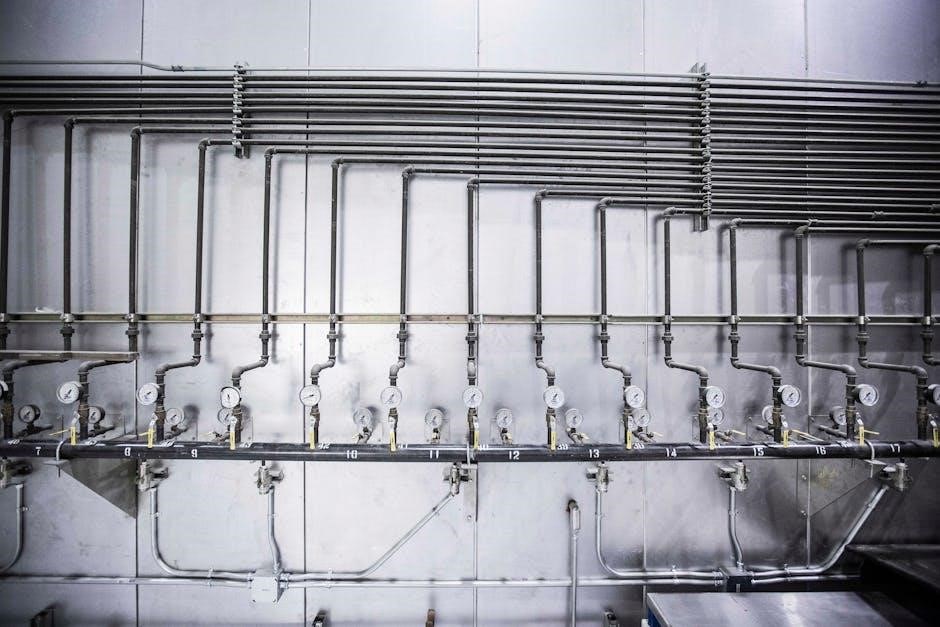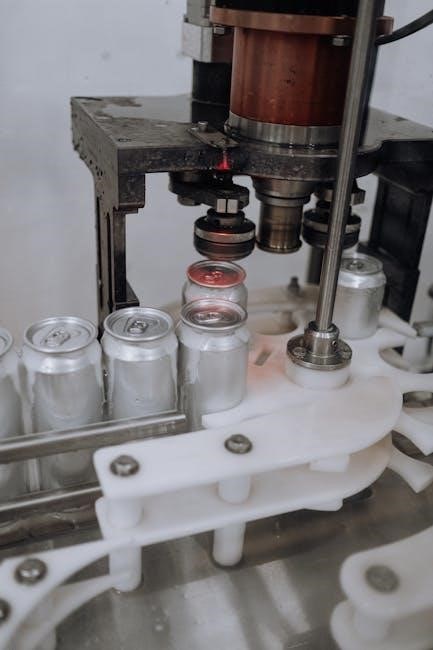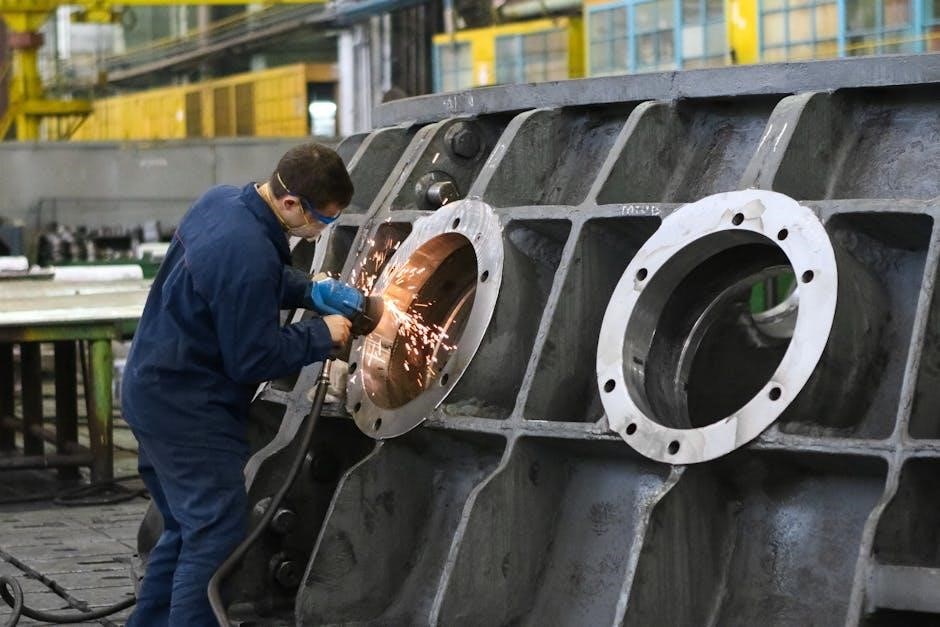Mechanical engineering is a diverse field focusing on the design, construction, and use of machines․ PDF resources like Shigley’s Mechanical Engineering Design and EngineeringHulk’s e-books provide foundational knowledge, covering thermodynamics, mechanics, and design principles essential for students and professionals․
What is Mechanical Engineering?
Mechanical engineering is one of the oldest and broadest engineering disciplines, focusing on the application of principles like energy, mechanics, and thermodynamics to design and manufacture machines and devices․ It encompasses a wide range of activities, from the creation of small mechanical components to large-scale systems․ The field is deeply rooted in physics and mathematics, enabling engineers to develop innovative solutions for industries such as automotive, aerospace, energy, and manufacturing․ Mechanical engineers work on everything from power generation systems to medical devices, ensuring efficiency, reliability, and safety․ PDF resources, such as textbooks and e-books, provide comprehensive insights into the fundamentals, including mechanics, thermodynamics, and design methodologies, serving as essential tools for both students and professionals․
Historical Overview of Mechanical Engineering
Mechanical engineering has deep roots in ancient civilizations, with early innovations like pulleys, levers, and water wheels․ The Middle Ages saw advancements in mechanical devices, inspired by figures like Hero of Alexandria, who conceptualized steam-powered machines․ The Industrial Revolution marked a significant turning point, as the steam engine, pioneered by James Watt, became a cornerstone of modern mechanical engineering․ This era also saw the formalization of the field, with the establishment of the first mechanical engineering departments in the 19th century, such as at University College London in 1847․ Over time, mechanical engineering has evolved alongside technological advancements, from the development of internal combustion engines to the integration of computers and automation․ Today, it remains a cornerstone of innovation, with historical resources like PDF books and e-books preserving its rich legacy for future generations․

Fundamental Concepts in Mechanical Engineering
Mechanical engineering relies on core principles like units, forces, and thermodynamics․ PDF resources, such as Shigley’s Mechanical Engineering Design, provide detailed insights into these foundational concepts, essential for both students and professionals․
Units and Measurements
Units and measurements are fundamental in mechanical engineering, ensuring consistency and accuracy in calculations․ PDF resources, such as Shigley’s Mechanical Engineering Design, emphasize the importance of understanding SI and Imperial systems․ These resources detail how to convert units and apply them in engineering contexts, including force, pressure, and energy measurements․ Proper unit usage is critical for designing and analyzing mechanical systems, as errors can lead to safety hazards or system failures․ PDF guides also provide exercises and examples to help engineers master unit conversions and dimensional analysis, ensuring precise and reliable results in real-world applications․ This foundational knowledge is essential for both students and professionals in the field, as it underpins all mechanical engineering principles and practices․
Engineering Scrutiny and Analysis
Engineering scrutiny and analysis are critical processes in mechanical engineering, involving the careful examination of designs, formulas, and results to ensure accuracy and reliability․ PDF resources, such as Shigley’s Mechanical Engineering Design, provide detailed methodologies for scrutinizing analytical solutions and computer-generated results․ These resources emphasize the importance of identifying errors, validating assumptions, and ensuring compliance with engineering standards․ Practical examples and exercises are included to help engineers develop robust analytical skills․ Scrutiny also extends to materials, manufacturing processes, and system performance, ensuring safety and efficiency․ By leveraging these PDF guides, engineers can refine their problem-solving abilities and deliver high-quality solutions in real-world applications․ This systematic approach is vital for maintaining integrity and innovation in mechanical engineering projects․
Statistics in Mechanical Engineering
Statistics play a crucial role in mechanical engineering, enabling engineers to analyze and interpret data for reliable decision-making․ Key concepts include mean, standard deviation, and stability of statistics, which are essential for understanding variability in engineering systems․ PDF resources, such as textbooks and lecture notes, provide detailed explanations of statistical methods and their applications in mechanical engineering․ These resources often include practical exercises and case studies, helping engineers master data analysis techniques․ Statistical tools are widely used in reliability analysis, quality control, and experimental design․ By leveraging statistical insights, engineers can optimize system performance, reduce uncertainties, and improve safety․ These PDF guides serve as invaluable references for both students and professionals, fostering a data-driven approach in mechanical engineering․

Applied Topics in Mechanical Engineering
Applied topics in mechanical engineering include thermodynamics, fluid mechanics, and mechanical systems design․ PDF resources provide comprehensive coverage of these areas, offering practical applications and problem-solving methodologies․
Thermodynamics and Heat Transfer
Thermodynamics and heat transfer are fundamental to mechanical engineering, focusing on energy conversion and thermal systems․ PDFs like Shigley’s Mechanical Engineering Design and resources from EngineeringHulk explore concepts such as energy laws, entropy, and heat transfer modes․ These materials are essential for understanding how energy is transformed and managed in systems like engines and boilers․ Practical applications include steam power generation and heating systems, where thermodynamic principles optimize efficiency and safety․ PDFs also provide detailed problem-solving methodologies, enabling engineers to analyze and design thermal systems effectively․ These resources are invaluable for both students and professionals seeking to deepen their knowledge in thermodynamics and its practical applications․
Fluid Mechanics and Dynamics
Fluid mechanics and dynamics are critical areas in mechanical engineering, dealing with the behavior of fluids and forces in motion․ PDF resources like EngineeringHulk and Shigley’s Mechanical Engineering Design provide detailed insights into fluid properties, flow dynamics, and pressure systems․ These materials cover essential topics such as Bernoulli’s principle, viscosity, and fluid energy transfer․ Practical applications include hydraulic systems, pumps, and pipelines, where understanding fluid behavior is crucial for efficient design and operation․ PDFs also offer problem-solving exercises and case studies, enabling engineers to apply theoretical knowledge to real-world challenges․ These resources are indispensable for students and professionals aiming to master fluid mechanics and its applications in various engineering scenarios․
Mechanical Systems Design
Mechanical systems design involves the creation and optimization of integrated systems, combining mechanical components to achieve specific functionalities․ PDF resources like Shigley’s Mechanical Engineering Design and EngineeringHulk’s e-books provide comprehensive guides on designing machinery, mechanisms, and robust systems․ These materials cover key aspects such as kinematics, dynamics, and materials selection, ensuring engineers can develop efficient and reliable solutions․ The design process often incorporates tools like CAD software and failure analysis to enhance precision and durability․ Practical applications include automotive systems, industrial machinery, and robotics․ PDFs also offer case studies and exercises, enabling learners to refine their design skills and adapt to emerging technologies in the field․

Practical Applications of Mechanical Engineering
Mechanical engineering applies to boilers, steam systems, and materials science․ PDFs detail industrial applications, manufacturing processes, and problem-solving methodologies, essential for real-world mechanical systems development․
Boilers and Steam Engineering
Boilers are closed vessels where water is heated to produce steam, essential for mechanical work in steam engines or turbines․ They are widely used in residential and industrial heating, sugar mills, and chemical plants․ Boilers are typically coal or oil-fired, making them a critical component in various industries․ PDF resources, such as those from EngineeringHulk, provide detailed insights into boiler design, operation, and safety․ These materials are invaluable for understanding steam engineering principles and their practical applications in mechanical systems․ By studying these resources, engineers can optimize boiler efficiency, ensuring reliable and safe steam production for industrial processes and power generation․ This knowledge is fundamental for advancing steam-based technologies in modern mechanical engineering․
Materials Science and Manufacturing
Materials science and manufacturing form the backbone of mechanical engineering, focusing on the properties and applications of various materials․ PDF resources, such as those available on EngineeringHulk, offer comprehensive insights into material selection, manufacturing processes, and quality control․ These materials cover topics like metals, polymers, and composites, detailing their mechanical properties and industrial applications․ Understanding material behavior under stress and strain is crucial for designing durable and efficient mechanical systems․ Additionally, advancements in manufacturing technologies, such as 3D printing and CNC machining, are explored in these resources, providing engineers with the tools to innovate and improve production methods․ By leveraging these PDF guides, professionals can stay updated on the latest trends and techniques in materials science and manufacturing, ensuring optimal performance and sustainability in their designs․
Problem-Solving Methodology
Problem-solving methodology in mechanical engineering involves structured approaches to analyze and resolve technical challenges․ PDF resources, such as those from Shigley and EngineeringHulk, emphasize systematic methods like defining problems, gathering data, and applying principles of mechanics and thermodynamics․ These guides highlight the importance of critical thinking and iterative design, encouraging engineers to test solutions and refine their approaches․ Advanced tools and software, discussed in these materials, further enhance problem-solving capabilities by enabling simulations and precise calculations․ By mastering these methodologies, mechanical engineers can effectively address complex issues, ensuring innovative and efficient solutions in their work․ These resources provide practical examples and exercises to hone problem-solving skills, making them invaluable for both students and professionals․

Resources for Mechanical Engineering
PDF books like Shigley’s Mechanical Engineering Design and e-books from EngineeringHulk offer comprehensive resources, covering thermodynamics, mechanics, and design tools essential for students and professionals alike․
PDF Books and E-Books
PDF books and e-books are invaluable resources for mechanical engineering students and professionals․ Platforms like EngineeringHulk offer free downloads of comprehensive texts covering thermodynamics, fluid mechanics, machine design, and materials science․ Shigley’s Mechanical Engineering Design and Fundamentals of Mechanical Engineering are popular choices, providing detailed explanations and practical applications․ These resources often include forewords, appendices, and problem-solving methodologies, making them essential for both academic and professional development․ They cater to engineers and technicians needing practical training, ensuring access to up-to-date knowledge in the field․ These PDFs are widely available, facilitating easy learning and reference for mechanical engineering enthusiasts worldwide․
Online Courses and Lecture Notes
Online courses and lecture notes are essential for mechanical engineering learning․ Platforms like Coursera and edX offer courses from top universities, covering topics such as thermodynamics, fluid mechanics, and design․ Iowa State University’s ME 270 course provides detailed notes on design practices․ Lecture notes from UCL and Drexel emphasize core engineering skills and research projects․ These resources often include problem-solving exercises and real-world applications, preparing students for industry challenges․ Accessible for free, they serve as valuable tools for global learners, fostering a deep understanding of mechanical engineering principles and their practical implementation․
Tools and Software for Mechanical Engineering
Mechanical engineering relies on advanced tools and software for design, simulation, and analysis․ CAD software like SolidWorks and AutoCAD are essential for creating detailed designs․ Simulation tools such as ANSYS and Abaqus enable engineers to test and optimize systems under various conditions; MATLAB and Python are widely used for data analysis and computational modeling․ These tools enhance precision, efficiency, and innovation in mechanical engineering projects․ Additionally, open-source platforms like FreeCAD and OpenFOAM provide cost-effective solutions for students and professionals․ The integration of these tools streamlines the engineering process, from conceptualization to production, ensuring high-performance and reliable outcomes in industries like aerospace, automotive, and manufacturing․
Mechanical engineering PDF resources provide comprehensive insights into design, thermodynamics, and mechanics, serving as invaluable tools for both students and professionals in advancing their knowledge and skills․
Future Trends in Mechanical Engineering
Mechanical engineering is evolving rapidly, with trends like renewable energy technologies, smart manufacturing, and advanced materials shaping the future․ PDF resources highlight innovations in robotics, automation, and sustainable design, offering insights into emerging fields․ These materials emphasize the integration of AI and IoT in mechanical systems, enabling smarter and more efficient solutions․ The rise of electric vehicles and green energy systems is also a focal point, with PDFs providing detailed analyses and case studies; Additionally, advancements in 3D printing and additive manufacturing are transforming production processes․ As the field progresses, PDFs serve as essential tools for staying updated on cutting-edge technologies and methodologies, ensuring mechanical engineers are well-prepared for future challenges and opportunities․
Importance of PDF Resources in Learning
PDF resources are indispensable for mechanical engineering education, offering comprehensive and accessible learning materials․ They provide detailed explanations of fundamental concepts, such as thermodynamics, mechanics, and design principles, in an organized and portable format․ Platforms like EngineeringHulk and lecture notes from universities make high-quality PDFs available for free, ensuring widespread accessibility․ These documents often include practical examples, case studies, and problem-solving methodologies, enabling learners to apply theoretical knowledge in real-world scenarios․ PDFs also serve as valuable references for exam preparation, such as GATE ME question papers, and cover emerging trends like sustainable energy and advanced manufacturing․ Their versatility and convenience make PDFs essential tools for both students and professionals in mechanical engineering․
